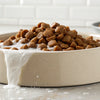Does Dry Dog Food Help Clean Teeth? Debunking the Myths of Kibble and Canine Dental Health
- Houndsy
Table of Contents
- Introduction
- Understanding Dog Dental Health
- Debunking the Kibble Myth
- The Best Practices for Dog Dental Care
- The Role of Diet in Overall Health
- Conclusion
- FAQs
Introduction
Picture this: You just watched your beloved pup crunching away on their kibble, and you're thinking, “Well, at least they’re cleaning their teeth while they eat!” It’s a comforting thought that many dog owners hold onto, believing that the dry food they provide is also helping to maintain their dog’s dental health. However, recent studies and veterinary insights suggest that this popular belief may be misleading.
As pet owners, we want what’s best for our furry friends, and dental health is a crucial aspect of their overall well-being. According to the American Veterinary Dental College, approximately 80% of dogs show signs of dental disease by the age of three. This statistic underscores the importance of understanding how our choices in diet can affect our dogs' teeth and gums.
In this blog post, we will explore the relationship between dry dog food and dental health, address common misconceptions, and provide insights into the best practices for maintaining your dog’s dental hygiene. By the end, you will have a clearer understanding of whether dry dog food really helps clean teeth and what steps you can take to enhance your dog's dental care routine.
Understanding Dog Dental Health
The Importance of Dental Care
Just like humans, dogs require regular dental care to prevent a host of health issues. The buildup of plaque can lead to tartar formation, which in turn can cause gingivitis and more severe periodontal disease. These conditions can lead to pain, tooth loss, and even systemic health problems as bacteria from the mouth enter the bloodstream.
Regular veterinary dental checkups and cleanings are essential, but many pet owners often wonder if their dog's diet can contribute to better oral health. This brings us to the question: Does dry dog food help clean teeth?
The Science Behind Plaque and Tartar
Before we dive into the myth of kibble as a dental cleaner, it’s essential to understand how plaque and tartar form. When dogs eat, food particles mix with saliva and bacteria to create a soft film on the teeth called plaque. If not removed through brushing or other means, plaque hardens into tartar, which can only be removed through professional dental cleanings.
The Role of Kibble in Dental Health
Many dog owners believe that the crunchiness of kibble helps scrape plaque off the teeth, similar to how crunchy foods might help clean human teeth. However, scientific evidence suggests that this is not the case. Let's explore the details.
Debunking the Kibble Myth
Research Findings
- Kibble Doesn’t Effectively Clean Teeth: A 1996 study involving over 1,350 dogs found no significant difference in dental disease levels between dogs fed dry food and those fed a wet or mixed diet. This indicates that typical kibble does not have a substantial impact on dental health.
- Inadequate Abrasive Action: While larger kibble sizes were hypothesized to have an abrasive effect, research conducted in 2007 showed that even increased kibble size did not significantly reduce tartar accumulation. The primary reason is that many dogs do not chew their kibble thoroughly enough for it to provide any meaningful cleaning action.
- High Starch Content: Traditional dry dog foods often contain high levels of refined carbohydrates, which can contribute to plaque formation. Starches break down into sugars that can exacerbate dental problems rather than mitigate them.
Misconceptions About Kibble and Dental Care
Despite the evidence, the myth that kibble cleans teeth persists. This misconception is often perpetuated by marketing claims from pet food companies that emphasize the "crunchy" nature of kibble. However, we must remember that while kibble can provide essential nutrients, it should not be relied upon as a primary means of dental cleaning.
The Best Practices for Dog Dental Care
Daily Brushing
The gold standard for maintaining your dog's dental health is daily brushing. Just as we brush our teeth to remove plaque before it hardens, the same principle applies to our dogs. Regular brushing can significantly reduce the buildup of plaque and tartar.
- Choosing the Right Tools: Use a soft-bristled toothbrush designed for dogs and toothpaste formulated specifically for canine use. Human toothpaste can be harmful to dogs, so always opt for pet-safe products.
- Creating a Routine: Establish a routine by brushing your dog’s teeth at the same time each day. This helps them get used to the process and makes it a part of their daily care.
Dental Chews and Treats
In addition to brushing, dental chews can be a beneficial supplement to your dog’s dental hygiene routine. Certain treats are designed to be abrasive, helping to scrape off plaque as your dog chews. Look for products that have received approval from the Veterinary Oral Health Council (VOHC).
Raw Meaty Bones
Incorporating raw meaty bones into your dog’s diet can also promote dental health. These bones provide an effective abrasive action against plaque buildup and are a natural option for cleaning teeth. However, it’s crucial to avoid cooked bones, as they can splinter and pose a risk of injury.
Regular Veterinary Checkups
Never underestimate the importance of regular veterinary checkups. Professional cleanings are critical for maintaining your dog’s dental health, especially for those who may have existing dental issues. Your veterinarian can provide guidance on the best care practices tailored to your dog’s specific needs.
The Role of Diet in Overall Health
Choosing the Right Food
While dry dog food alone is inadequate for dental health, choosing high-quality food is essential for overall well-being. Look for dog food that contains natural ingredients, is free from fillers, and meets the nutritional needs of your pet.
At Houndsy, we emphasize our commitment to quality and design excellence, which extends to our Houndsy Kibble Dispenser. Our innovative product not only offers an ergonomic feeding experience but also accommodates high-quality kibble that supports your dog’s overall nutrition.
Incorporating Fresh Foods
Adding fresh fruits, vegetables, and raw meats to your dog’s diet can promote better dental health and overall wellness. Foods like carrots and apples can provide natural crunchiness that may help clean teeth, while raw meats contain enzymes that assist in breaking down food particles.
Hydration and Saliva Production
Ensuring your dog stays hydrated is also crucial for dental health. Adequate water intake promotes saliva production, which helps neutralize acids in the mouth and wash away food particles and bacteria.
Conclusion
To answer the question, does dry dog food help clean teeth? The evidence suggests that typical kibble does not effectively clean your dog's teeth and may even contribute to dental issues due to high starch content. As responsible pet owners, we need to prioritize a multi-faceted approach to dental health that includes regular brushing, the use of dental chews, and routine veterinary checkups.
By implementing these practices, we can help ensure our furry companions enjoy a healthy mouth and a longer, happier life. As you consider the best feeding solutions for your dog, we invite you to explore the Houndsy Kibble Dispenser, designed to enhance your dog feeding experience with convenience, consistency, and a touch of modern design.
FAQs
1. Can I solely rely on dry dog food for my dog’s dental health?
While dry food can be part of your dog's diet, it should not be relied upon as the primary means of maintaining dental health. Daily brushing and regular veterinary checkups are essential components of a comprehensive dental care routine.
2. What are some signs of dental disease in dogs?
Signs of dental disease may include bad breath, swollen gums, difficulty eating, and visible tartar buildup on teeth. If you notice any of these signs, consult your veterinarian for an evaluation.
3. Are there specific dental chews I should consider?
Look for dental chews that have received approval from the Veterinary Oral Health Council (VOHC). These products have been tested for their effectiveness in reducing plaque and tartar.
4. How often should I brush my dog’s teeth?
Ideally, you should aim to brush your dog’s teeth daily. However, if that’s not feasible, try to brush at least a few times a week to maintain good dental health.
5. Are raw meaty bones safe for all dogs?
While raw meaty bones can be beneficial for dental health, always supervise your dog while they are chewing. Ensure the bones are appropriate for your dog’s size and chewing habits, and never feed cooked bones.
By prioritizing your dog’s dental health with the right practices and products, we can help them lead healthier, happier lives.












